An Analysis of Organisational Behaviour at TESCO Report
VerifiedAdded on 2021/02/20
|16
|5297
|32
Report
AI Summary
This report provides a detailed analysis of organisational behaviour within TESCO, a major British retailer. It explores the impact of key organisational aspects like culture, politics, and power on individual and team conduct. The report examines different types of organisational cultures (role, task, person, and power) and their implications for employee motivation and productivity. It then delves into various motivation theories, including Maslow's Need Hierarchy and Vroom's Expectancy Theory, and their practical application within TESCO. Furthermore, the report discusses team development theories and Belbin's Team Role theories to facilitate dynamic cooperation. The report also critiques the relationships between culture, politics, power and motivation, and team development theories and organizational behavior concepts influencing workplace behavior, concluding with recommendations for enhancing employee performance and fostering a positive work environment.
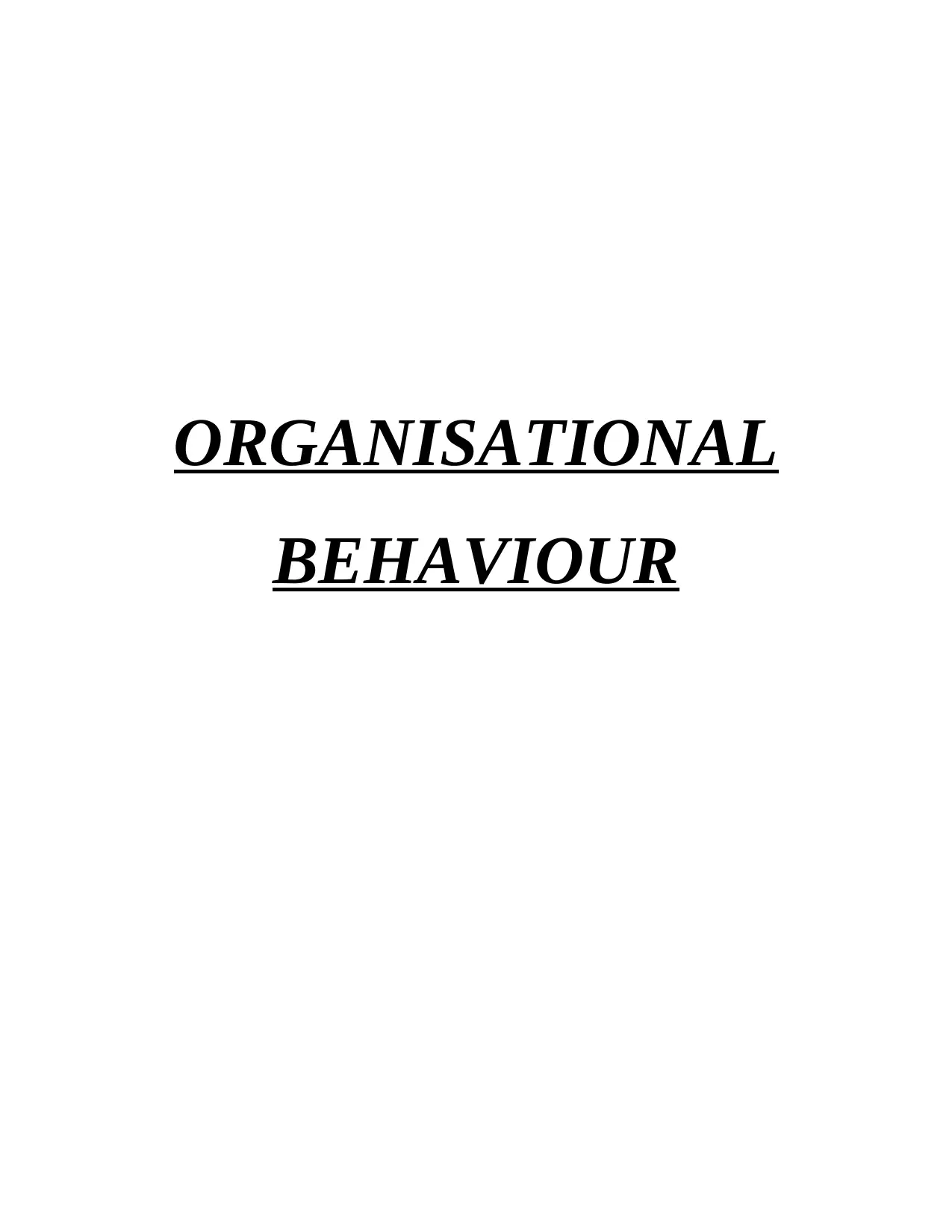
ORGANISATIONAL
BEHAVIOUR
BEHAVIOUR
Paraphrase This Document
Need a fresh take? Get an instant paraphrase of this document with our AI Paraphraser
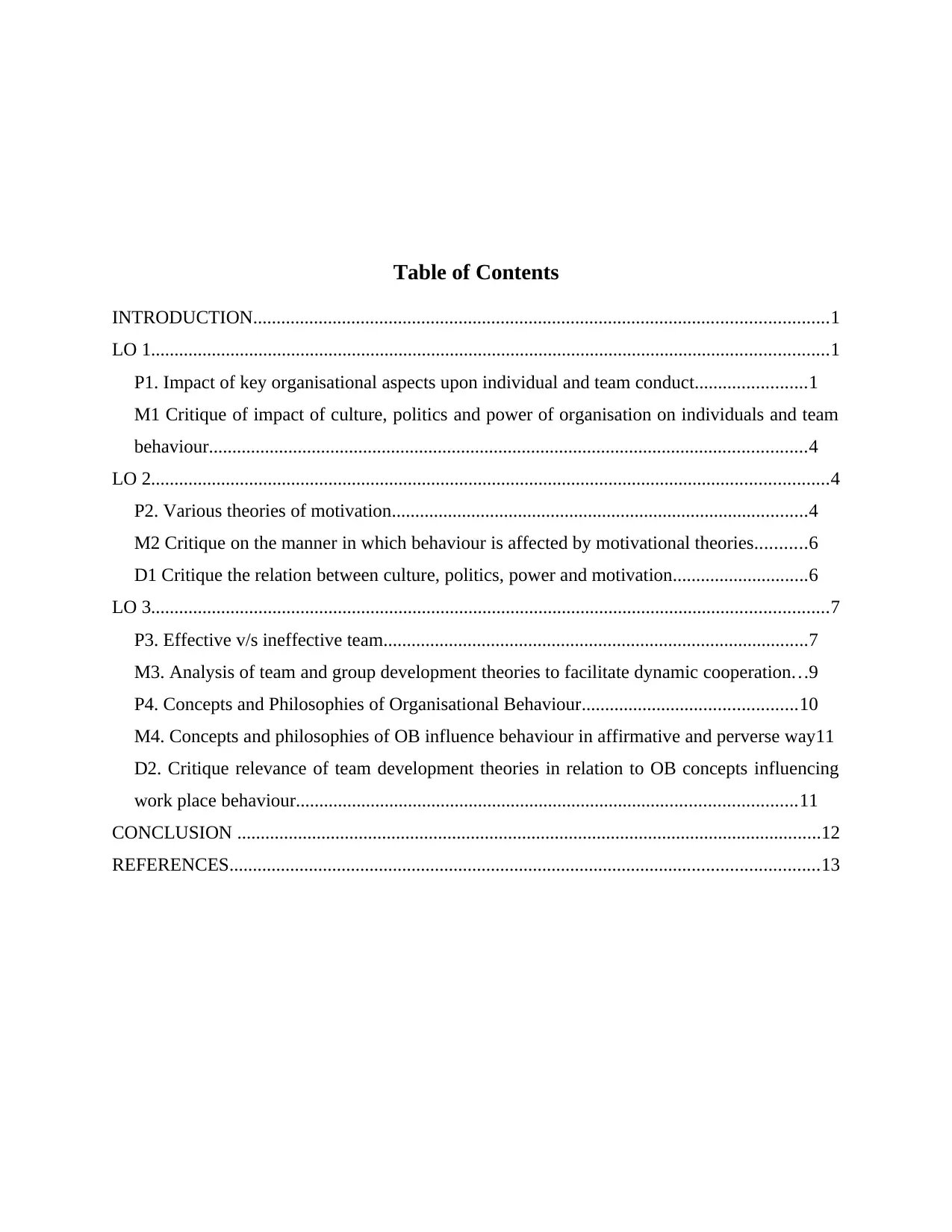
Table of Contents
INTRODUCTION...........................................................................................................................1
LO 1.................................................................................................................................................1
P1. Impact of key organisational aspects upon individual and team conduct........................1
M1 Critique of impact of culture, politics and power of organisation on individuals and team
behaviour................................................................................................................................4
LO 2.................................................................................................................................................4
P2. Various theories of motivation.........................................................................................4
M2 Critique on the manner in which behaviour is affected by motivational theories...........6
D1 Critique the relation between culture, politics, power and motivation.............................6
LO 3.................................................................................................................................................7
P3. Effective v/s ineffective team...........................................................................................7
M3. Analysis of team and group development theories to facilitate dynamic cooperation...9
P4. Concepts and Philosophies of Organisational Behaviour..............................................10
M4. Concepts and philosophies of OB influence behaviour in affirmative and perverse way11
D2. Critique relevance of team development theories in relation to OB concepts influencing
work place behaviour...........................................................................................................11
CONCLUSION .............................................................................................................................12
REFERENCES..............................................................................................................................13
INTRODUCTION...........................................................................................................................1
LO 1.................................................................................................................................................1
P1. Impact of key organisational aspects upon individual and team conduct........................1
M1 Critique of impact of culture, politics and power of organisation on individuals and team
behaviour................................................................................................................................4
LO 2.................................................................................................................................................4
P2. Various theories of motivation.........................................................................................4
M2 Critique on the manner in which behaviour is affected by motivational theories...........6
D1 Critique the relation between culture, politics, power and motivation.............................6
LO 3.................................................................................................................................................7
P3. Effective v/s ineffective team...........................................................................................7
M3. Analysis of team and group development theories to facilitate dynamic cooperation...9
P4. Concepts and Philosophies of Organisational Behaviour..............................................10
M4. Concepts and philosophies of OB influence behaviour in affirmative and perverse way11
D2. Critique relevance of team development theories in relation to OB concepts influencing
work place behaviour...........................................................................................................11
CONCLUSION .............................................................................................................................12
REFERENCES..............................................................................................................................13

⊘ This is a preview!⊘
Do you want full access?
Subscribe today to unlock all pages.

Trusted by 1+ million students worldwide
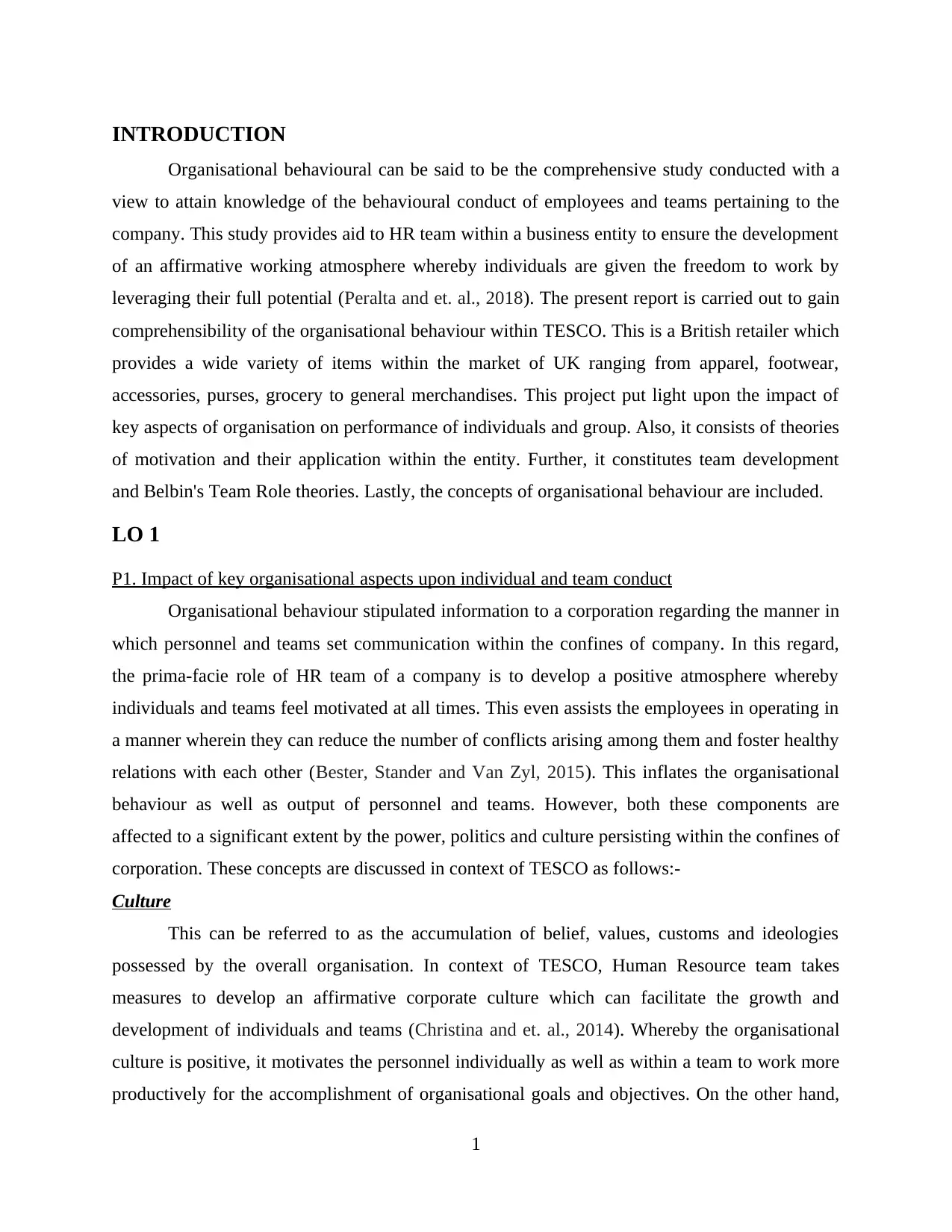
INTRODUCTION
Organisational behavioural can be said to be the comprehensive study conducted with a
view to attain knowledge of the behavioural conduct of employees and teams pertaining to the
company. This study provides aid to HR team within a business entity to ensure the development
of an affirmative working atmosphere whereby individuals are given the freedom to work by
leveraging their full potential (Peralta and et. al., 2018). The present report is carried out to gain
comprehensibility of the organisational behaviour within TESCO. This is a British retailer which
provides a wide variety of items within the market of UK ranging from apparel, footwear,
accessories, purses, grocery to general merchandises. This project put light upon the impact of
key aspects of organisation on performance of individuals and group. Also, it consists of theories
of motivation and their application within the entity. Further, it constitutes team development
and Belbin's Team Role theories. Lastly, the concepts of organisational behaviour are included.
LO 1
P1. Impact of key organisational aspects upon individual and team conduct
Organisational behaviour stipulated information to a corporation regarding the manner in
which personnel and teams set communication within the confines of company. In this regard,
the prima-facie role of HR team of a company is to develop a positive atmosphere whereby
individuals and teams feel motivated at all times. This even assists the employees in operating in
a manner wherein they can reduce the number of conflicts arising among them and foster healthy
relations with each other (Bester, Stander and Van Zyl, 2015). This inflates the organisational
behaviour as well as output of personnel and teams. However, both these components are
affected to a significant extent by the power, politics and culture persisting within the confines of
corporation. These concepts are discussed in context of TESCO as follows:-
Culture
This can be referred to as the accumulation of belief, values, customs and ideologies
possessed by the overall organisation. In context of TESCO, Human Resource team takes
measures to develop an affirmative corporate culture which can facilitate the growth and
development of individuals and teams (Christina and et. al., 2014). Whereby the organisational
culture is positive, it motivates the personnel individually as well as within a team to work more
productively for the accomplishment of organisational goals and objectives. On the other hand,
1
Organisational behavioural can be said to be the comprehensive study conducted with a
view to attain knowledge of the behavioural conduct of employees and teams pertaining to the
company. This study provides aid to HR team within a business entity to ensure the development
of an affirmative working atmosphere whereby individuals are given the freedom to work by
leveraging their full potential (Peralta and et. al., 2018). The present report is carried out to gain
comprehensibility of the organisational behaviour within TESCO. This is a British retailer which
provides a wide variety of items within the market of UK ranging from apparel, footwear,
accessories, purses, grocery to general merchandises. This project put light upon the impact of
key aspects of organisation on performance of individuals and group. Also, it consists of theories
of motivation and their application within the entity. Further, it constitutes team development
and Belbin's Team Role theories. Lastly, the concepts of organisational behaviour are included.
LO 1
P1. Impact of key organisational aspects upon individual and team conduct
Organisational behaviour stipulated information to a corporation regarding the manner in
which personnel and teams set communication within the confines of company. In this regard,
the prima-facie role of HR team of a company is to develop a positive atmosphere whereby
individuals and teams feel motivated at all times. This even assists the employees in operating in
a manner wherein they can reduce the number of conflicts arising among them and foster healthy
relations with each other (Bester, Stander and Van Zyl, 2015). This inflates the organisational
behaviour as well as output of personnel and teams. However, both these components are
affected to a significant extent by the power, politics and culture persisting within the confines of
corporation. These concepts are discussed in context of TESCO as follows:-
Culture
This can be referred to as the accumulation of belief, values, customs and ideologies
possessed by the overall organisation. In context of TESCO, Human Resource team takes
measures to develop an affirmative corporate culture which can facilitate the growth and
development of individuals and teams (Christina and et. al., 2014). Whereby the organisational
culture is positive, it motivates the personnel individually as well as within a team to work more
productively for the accomplishment of organisational goals and objectives. On the other hand,
1
Paraphrase This Document
Need a fresh take? Get an instant paraphrase of this document with our AI Paraphraser
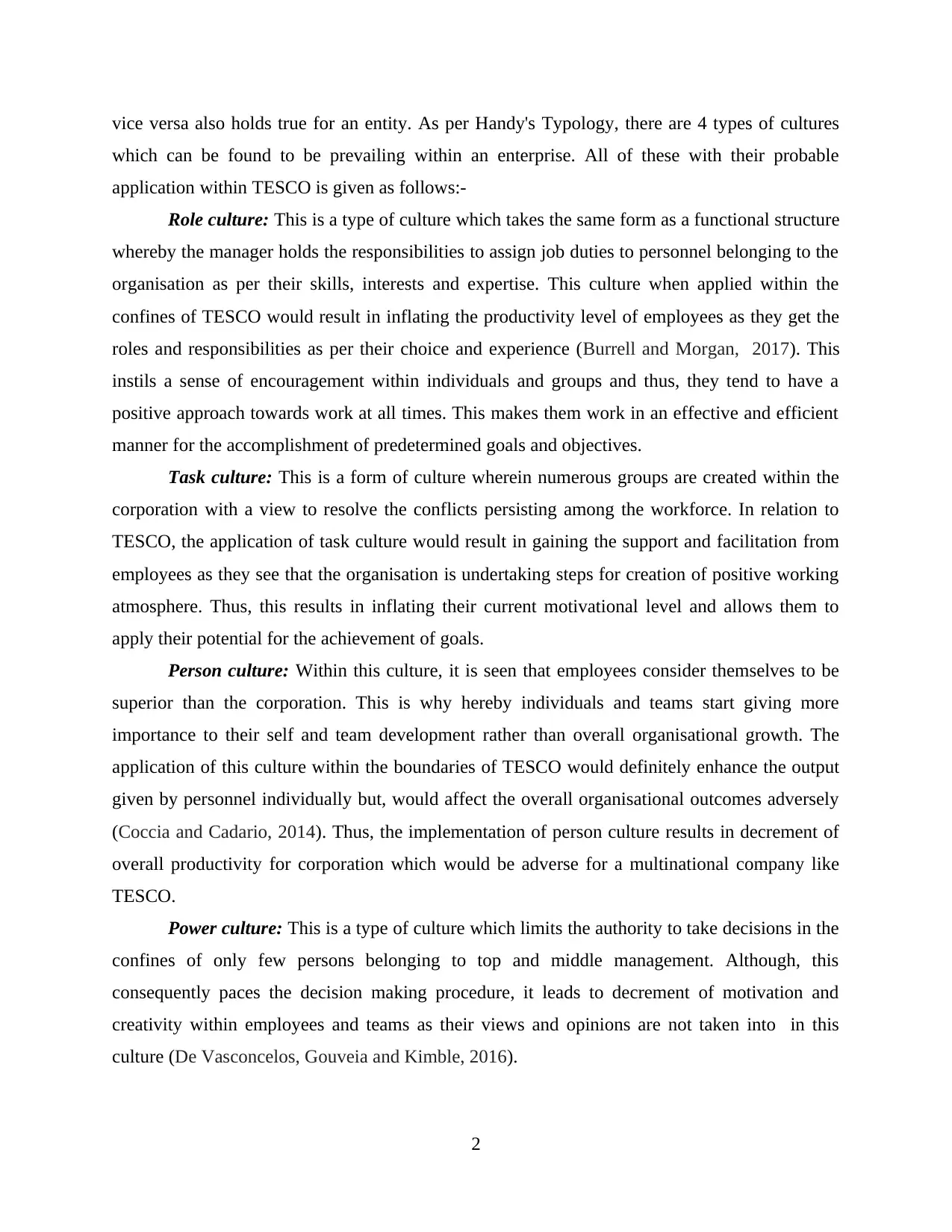
vice versa also holds true for an entity. As per Handy's Typology, there are 4 types of cultures
which can be found to be prevailing within an enterprise. All of these with their probable
application within TESCO is given as follows:-
Role culture: This is a type of culture which takes the same form as a functional structure
whereby the manager holds the responsibilities to assign job duties to personnel belonging to the
organisation as per their skills, interests and expertise. This culture when applied within the
confines of TESCO would result in inflating the productivity level of employees as they get the
roles and responsibilities as per their choice and experience (Burrell and Morgan, 2017). This
instils a sense of encouragement within individuals and groups and thus, they tend to have a
positive approach towards work at all times. This makes them work in an effective and efficient
manner for the accomplishment of predetermined goals and objectives.
Task culture: This is a form of culture wherein numerous groups are created within the
corporation with a view to resolve the conflicts persisting among the workforce. In relation to
TESCO, the application of task culture would result in gaining the support and facilitation from
employees as they see that the organisation is undertaking steps for creation of positive working
atmosphere. Thus, this results in inflating their current motivational level and allows them to
apply their potential for the achievement of goals.
Person culture: Within this culture, it is seen that employees consider themselves to be
superior than the corporation. This is why hereby individuals and teams start giving more
importance to their self and team development rather than overall organisational growth. The
application of this culture within the boundaries of TESCO would definitely enhance the output
given by personnel individually but, would affect the overall organisational outcomes adversely
(Coccia and Cadario, 2014). Thus, the implementation of person culture results in decrement of
overall productivity for corporation which would be adverse for a multinational company like
TESCO.
Power culture: This is a type of culture which limits the authority to take decisions in the
confines of only few persons belonging to top and middle management. Although, this
consequently paces the decision making procedure, it leads to decrement of motivation and
creativity within employees and teams as their views and opinions are not taken into in this
culture (De Vasconcelos, Gouveia and Kimble, 2016).
2
which can be found to be prevailing within an enterprise. All of these with their probable
application within TESCO is given as follows:-
Role culture: This is a type of culture which takes the same form as a functional structure
whereby the manager holds the responsibilities to assign job duties to personnel belonging to the
organisation as per their skills, interests and expertise. This culture when applied within the
confines of TESCO would result in inflating the productivity level of employees as they get the
roles and responsibilities as per their choice and experience (Burrell and Morgan, 2017). This
instils a sense of encouragement within individuals and groups and thus, they tend to have a
positive approach towards work at all times. This makes them work in an effective and efficient
manner for the accomplishment of predetermined goals and objectives.
Task culture: This is a form of culture wherein numerous groups are created within the
corporation with a view to resolve the conflicts persisting among the workforce. In relation to
TESCO, the application of task culture would result in gaining the support and facilitation from
employees as they see that the organisation is undertaking steps for creation of positive working
atmosphere. Thus, this results in inflating their current motivational level and allows them to
apply their potential for the achievement of goals.
Person culture: Within this culture, it is seen that employees consider themselves to be
superior than the corporation. This is why hereby individuals and teams start giving more
importance to their self and team development rather than overall organisational growth. The
application of this culture within the boundaries of TESCO would definitely enhance the output
given by personnel individually but, would affect the overall organisational outcomes adversely
(Coccia and Cadario, 2014). Thus, the implementation of person culture results in decrement of
overall productivity for corporation which would be adverse for a multinational company like
TESCO.
Power culture: This is a type of culture which limits the authority to take decisions in the
confines of only few persons belonging to top and middle management. Although, this
consequently paces the decision making procedure, it leads to decrement of motivation and
creativity within employees and teams as their views and opinions are not taken into in this
culture (De Vasconcelos, Gouveia and Kimble, 2016).
2
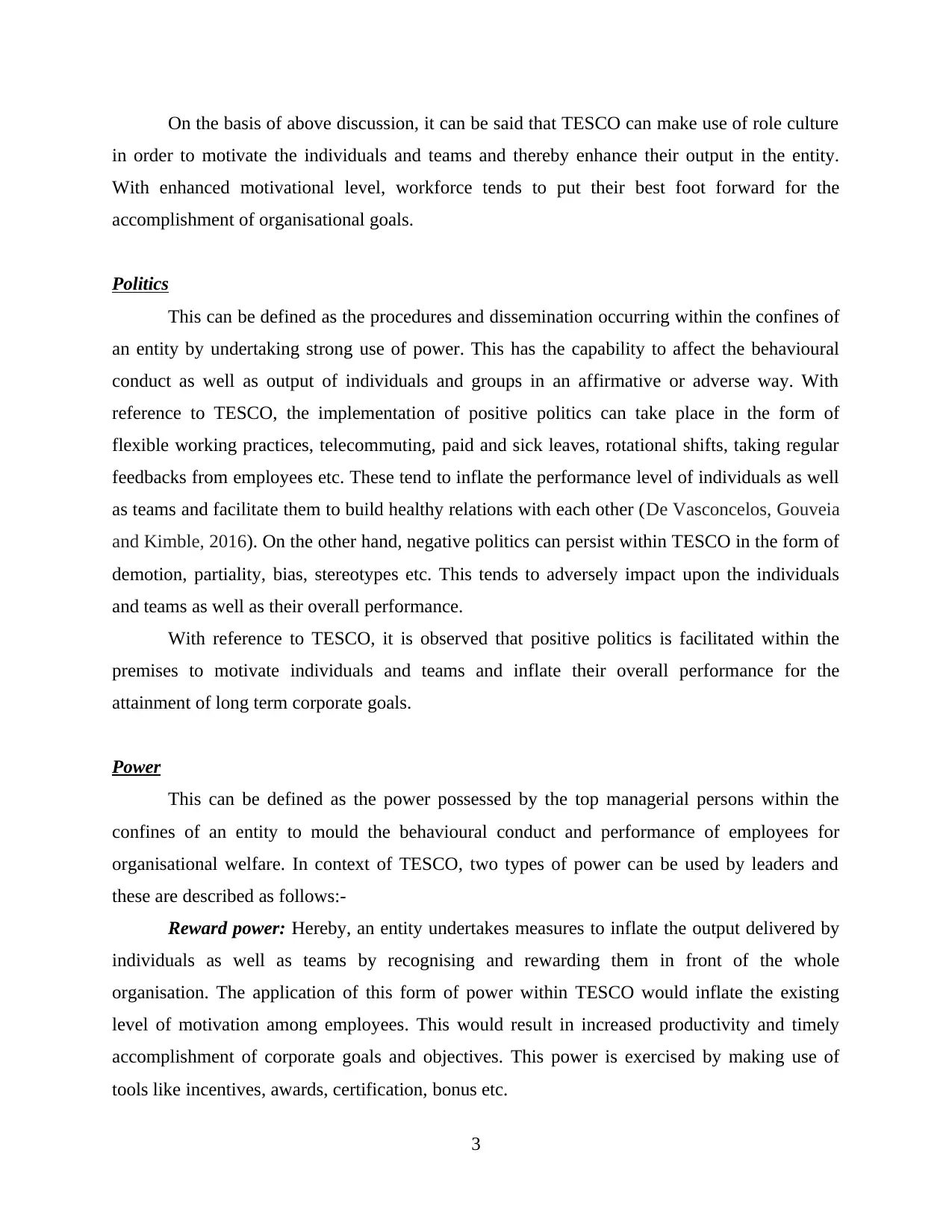
On the basis of above discussion, it can be said that TESCO can make use of role culture
in order to motivate the individuals and teams and thereby enhance their output in the entity.
With enhanced motivational level, workforce tends to put their best foot forward for the
accomplishment of organisational goals.
Politics
This can be defined as the procedures and dissemination occurring within the confines of
an entity by undertaking strong use of power. This has the capability to affect the behavioural
conduct as well as output of individuals and groups in an affirmative or adverse way. With
reference to TESCO, the implementation of positive politics can take place in the form of
flexible working practices, telecommuting, paid and sick leaves, rotational shifts, taking regular
feedbacks from employees etc. These tend to inflate the performance level of individuals as well
as teams and facilitate them to build healthy relations with each other (De Vasconcelos, Gouveia
and Kimble, 2016). On the other hand, negative politics can persist within TESCO in the form of
demotion, partiality, bias, stereotypes etc. This tends to adversely impact upon the individuals
and teams as well as their overall performance.
With reference to TESCO, it is observed that positive politics is facilitated within the
premises to motivate individuals and teams and inflate their overall performance for the
attainment of long term corporate goals.
Power
This can be defined as the power possessed by the top managerial persons within the
confines of an entity to mould the behavioural conduct and performance of employees for
organisational welfare. In context of TESCO, two types of power can be used by leaders and
these are described as follows:-
Reward power: Hereby, an entity undertakes measures to inflate the output delivered by
individuals as well as teams by recognising and rewarding them in front of the whole
organisation. The application of this form of power within TESCO would inflate the existing
level of motivation among employees. This would result in increased productivity and timely
accomplishment of corporate goals and objectives. This power is exercised by making use of
tools like incentives, awards, certification, bonus etc.
3
in order to motivate the individuals and teams and thereby enhance their output in the entity.
With enhanced motivational level, workforce tends to put their best foot forward for the
accomplishment of organisational goals.
Politics
This can be defined as the procedures and dissemination occurring within the confines of
an entity by undertaking strong use of power. This has the capability to affect the behavioural
conduct as well as output of individuals and groups in an affirmative or adverse way. With
reference to TESCO, the implementation of positive politics can take place in the form of
flexible working practices, telecommuting, paid and sick leaves, rotational shifts, taking regular
feedbacks from employees etc. These tend to inflate the performance level of individuals as well
as teams and facilitate them to build healthy relations with each other (De Vasconcelos, Gouveia
and Kimble, 2016). On the other hand, negative politics can persist within TESCO in the form of
demotion, partiality, bias, stereotypes etc. This tends to adversely impact upon the individuals
and teams as well as their overall performance.
With reference to TESCO, it is observed that positive politics is facilitated within the
premises to motivate individuals and teams and inflate their overall performance for the
attainment of long term corporate goals.
Power
This can be defined as the power possessed by the top managerial persons within the
confines of an entity to mould the behavioural conduct and performance of employees for
organisational welfare. In context of TESCO, two types of power can be used by leaders and
these are described as follows:-
Reward power: Hereby, an entity undertakes measures to inflate the output delivered by
individuals as well as teams by recognising and rewarding them in front of the whole
organisation. The application of this form of power within TESCO would inflate the existing
level of motivation among employees. This would result in increased productivity and timely
accomplishment of corporate goals and objectives. This power is exercised by making use of
tools like incentives, awards, certification, bonus etc.
3
⊘ This is a preview!⊘
Do you want full access?
Subscribe today to unlock all pages.

Trusted by 1+ million students worldwide
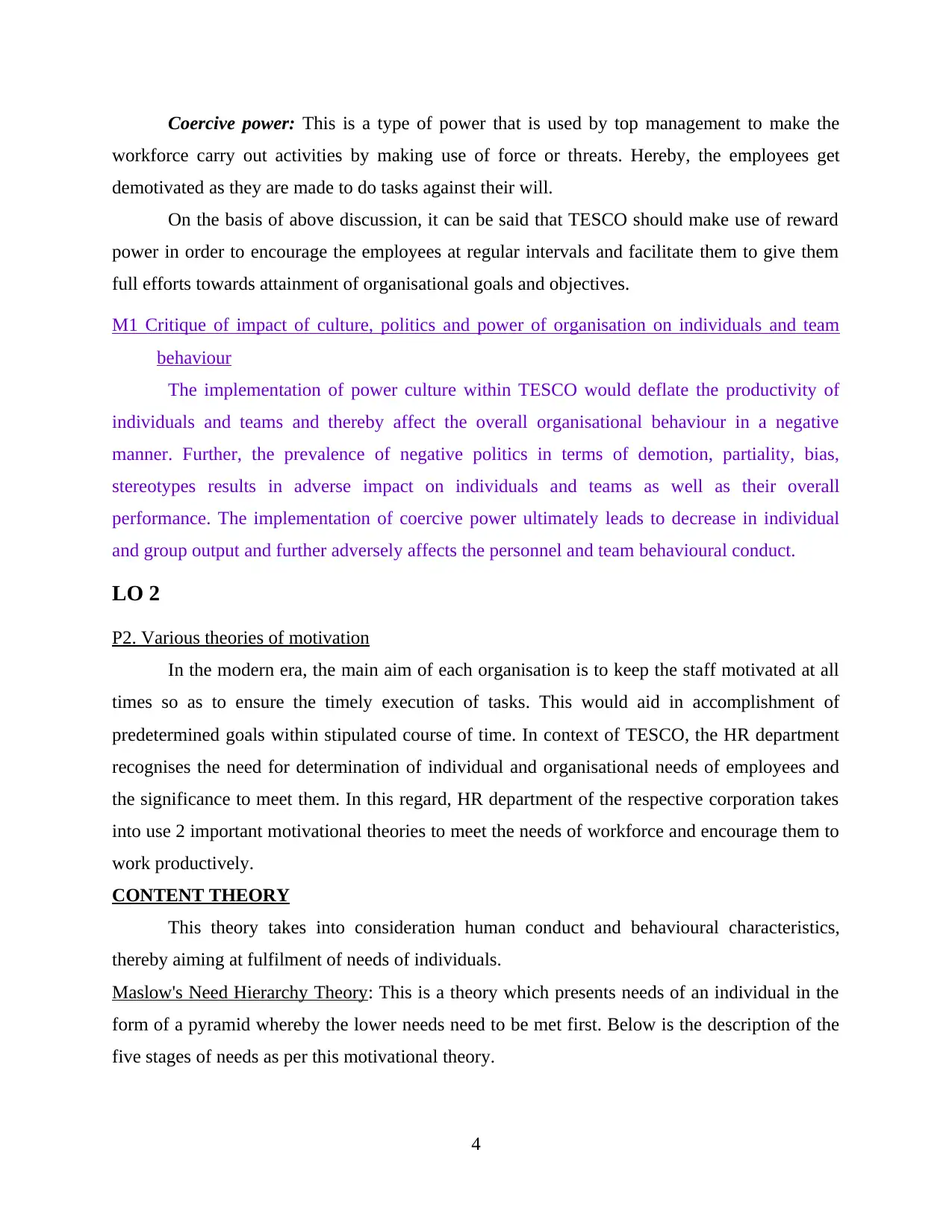
Coercive power: This is a type of power that is used by top management to make the
workforce carry out activities by making use of force or threats. Hereby, the employees get
demotivated as they are made to do tasks against their will.
On the basis of above discussion, it can be said that TESCO should make use of reward
power in order to encourage the employees at regular intervals and facilitate them to give them
full efforts towards attainment of organisational goals and objectives.
M1 Critique of impact of culture, politics and power of organisation on individuals and team
behaviour
The implementation of power culture within TESCO would deflate the productivity of
individuals and teams and thereby affect the overall organisational behaviour in a negative
manner. Further, the prevalence of negative politics in terms of demotion, partiality, bias,
stereotypes results in adverse impact on individuals and teams as well as their overall
performance. The implementation of coercive power ultimately leads to decrease in individual
and group output and further adversely affects the personnel and team behavioural conduct.
LO 2
P2. Various theories of motivation
In the modern era, the main aim of each organisation is to keep the staff motivated at all
times so as to ensure the timely execution of tasks. This would aid in accomplishment of
predetermined goals within stipulated course of time. In context of TESCO, the HR department
recognises the need for determination of individual and organisational needs of employees and
the significance to meet them. In this regard, HR department of the respective corporation takes
into use 2 important motivational theories to meet the needs of workforce and encourage them to
work productively.
CONTENT THEORY
This theory takes into consideration human conduct and behavioural characteristics,
thereby aiming at fulfilment of needs of individuals.
Maslow's Need Hierarchy Theory: This is a theory which presents needs of an individual in the
form of a pyramid whereby the lower needs need to be met first. Below is the description of the
five stages of needs as per this motivational theory.
4
workforce carry out activities by making use of force or threats. Hereby, the employees get
demotivated as they are made to do tasks against their will.
On the basis of above discussion, it can be said that TESCO should make use of reward
power in order to encourage the employees at regular intervals and facilitate them to give them
full efforts towards attainment of organisational goals and objectives.
M1 Critique of impact of culture, politics and power of organisation on individuals and team
behaviour
The implementation of power culture within TESCO would deflate the productivity of
individuals and teams and thereby affect the overall organisational behaviour in a negative
manner. Further, the prevalence of negative politics in terms of demotion, partiality, bias,
stereotypes results in adverse impact on individuals and teams as well as their overall
performance. The implementation of coercive power ultimately leads to decrease in individual
and group output and further adversely affects the personnel and team behavioural conduct.
LO 2
P2. Various theories of motivation
In the modern era, the main aim of each organisation is to keep the staff motivated at all
times so as to ensure the timely execution of tasks. This would aid in accomplishment of
predetermined goals within stipulated course of time. In context of TESCO, the HR department
recognises the need for determination of individual and organisational needs of employees and
the significance to meet them. In this regard, HR department of the respective corporation takes
into use 2 important motivational theories to meet the needs of workforce and encourage them to
work productively.
CONTENT THEORY
This theory takes into consideration human conduct and behavioural characteristics,
thereby aiming at fulfilment of needs of individuals.
Maslow's Need Hierarchy Theory: This is a theory which presents needs of an individual in the
form of a pyramid whereby the lower needs need to be met first. Below is the description of the
five stages of needs as per this motivational theory.
4
Paraphrase This Document
Need a fresh take? Get an instant paraphrase of this document with our AI Paraphraser
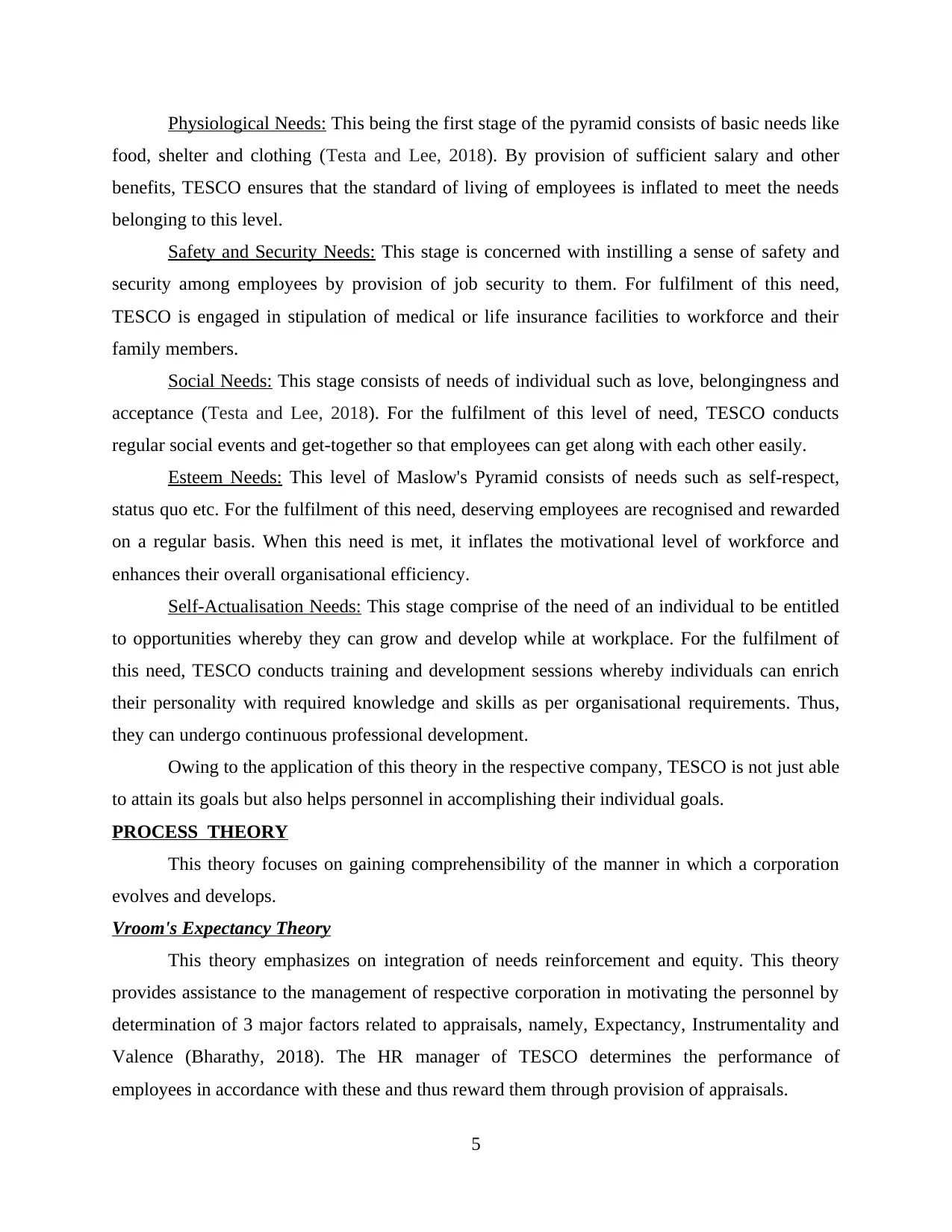
Physiological Needs: This being the first stage of the pyramid consists of basic needs like
food, shelter and clothing (Testa and Lee, 2018). By provision of sufficient salary and other
benefits, TESCO ensures that the standard of living of employees is inflated to meet the needs
belonging to this level.
Safety and Security Needs: This stage is concerned with instilling a sense of safety and
security among employees by provision of job security to them. For fulfilment of this need,
TESCO is engaged in stipulation of medical or life insurance facilities to workforce and their
family members.
Social Needs: This stage consists of needs of individual such as love, belongingness and
acceptance (Testa and Lee, 2018). For the fulfilment of this level of need, TESCO conducts
regular social events and get-together so that employees can get along with each other easily.
Esteem Needs: This level of Maslow's Pyramid consists of needs such as self-respect,
status quo etc. For the fulfilment of this need, deserving employees are recognised and rewarded
on a regular basis. When this need is met, it inflates the motivational level of workforce and
enhances their overall organisational efficiency.
Self-Actualisation Needs: This stage comprise of the need of an individual to be entitled
to opportunities whereby they can grow and develop while at workplace. For the fulfilment of
this need, TESCO conducts training and development sessions whereby individuals can enrich
their personality with required knowledge and skills as per organisational requirements. Thus,
they can undergo continuous professional development.
Owing to the application of this theory in the respective company, TESCO is not just able
to attain its goals but also helps personnel in accomplishing their individual goals.
PROCESS THEORY
This theory focuses on gaining comprehensibility of the manner in which a corporation
evolves and develops.
Vroom's Expectancy Theory
This theory emphasizes on integration of needs reinforcement and equity. This theory
provides assistance to the management of respective corporation in motivating the personnel by
determination of 3 major factors related to appraisals, namely, Expectancy, Instrumentality and
Valence (Bharathy, 2018). The HR manager of TESCO determines the performance of
employees in accordance with these and thus reward them through provision of appraisals.
5
food, shelter and clothing (Testa and Lee, 2018). By provision of sufficient salary and other
benefits, TESCO ensures that the standard of living of employees is inflated to meet the needs
belonging to this level.
Safety and Security Needs: This stage is concerned with instilling a sense of safety and
security among employees by provision of job security to them. For fulfilment of this need,
TESCO is engaged in stipulation of medical or life insurance facilities to workforce and their
family members.
Social Needs: This stage consists of needs of individual such as love, belongingness and
acceptance (Testa and Lee, 2018). For the fulfilment of this level of need, TESCO conducts
regular social events and get-together so that employees can get along with each other easily.
Esteem Needs: This level of Maslow's Pyramid consists of needs such as self-respect,
status quo etc. For the fulfilment of this need, deserving employees are recognised and rewarded
on a regular basis. When this need is met, it inflates the motivational level of workforce and
enhances their overall organisational efficiency.
Self-Actualisation Needs: This stage comprise of the need of an individual to be entitled
to opportunities whereby they can grow and develop while at workplace. For the fulfilment of
this need, TESCO conducts training and development sessions whereby individuals can enrich
their personality with required knowledge and skills as per organisational requirements. Thus,
they can undergo continuous professional development.
Owing to the application of this theory in the respective company, TESCO is not just able
to attain its goals but also helps personnel in accomplishing their individual goals.
PROCESS THEORY
This theory focuses on gaining comprehensibility of the manner in which a corporation
evolves and develops.
Vroom's Expectancy Theory
This theory emphasizes on integration of needs reinforcement and equity. This theory
provides assistance to the management of respective corporation in motivating the personnel by
determination of 3 major factors related to appraisals, namely, Expectancy, Instrumentality and
Valence (Bharathy, 2018). The HR manager of TESCO determines the performance of
employees in accordance with these and thus reward them through provision of appraisals.
5
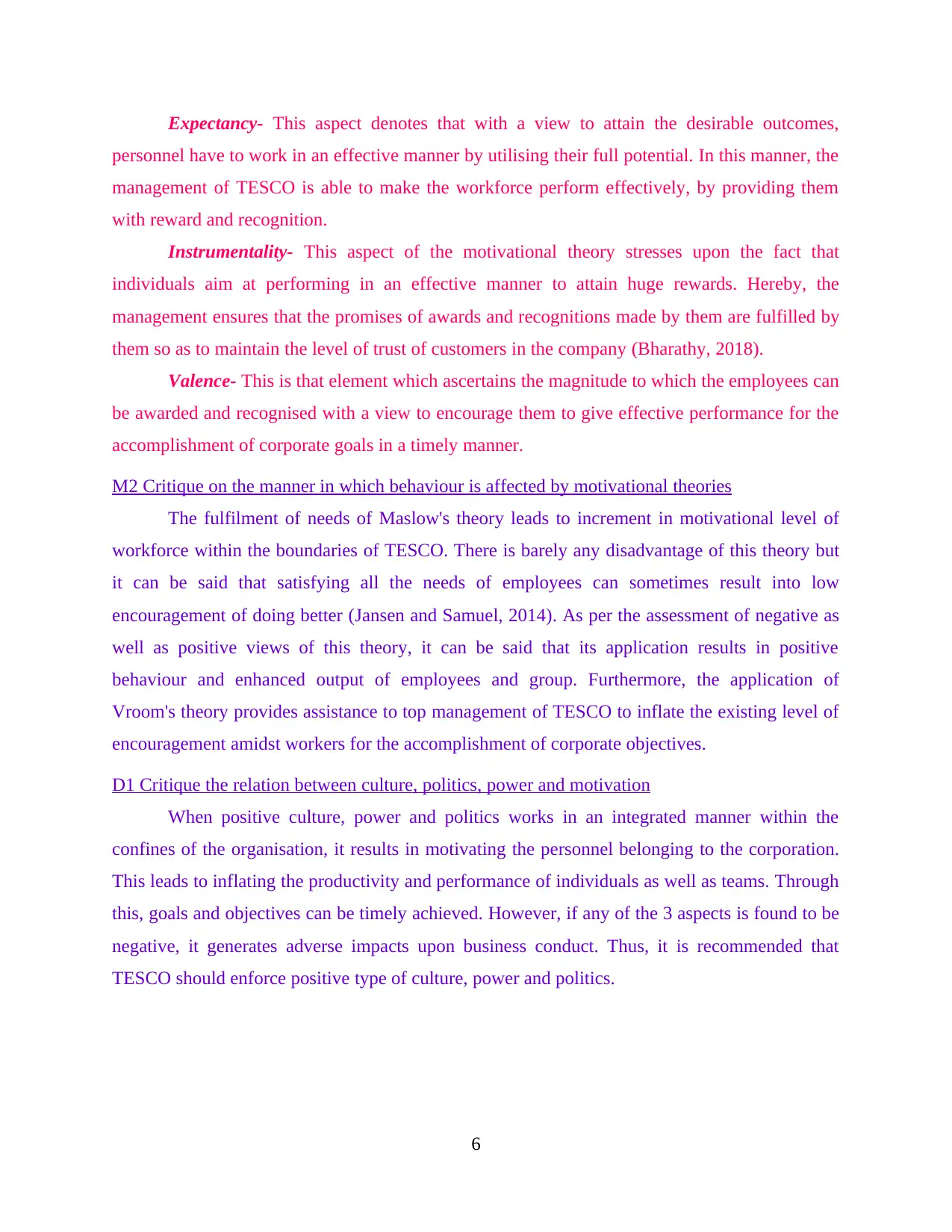
Expectancy- This aspect denotes that with a view to attain the desirable outcomes,
personnel have to work in an effective manner by utilising their full potential. In this manner, the
management of TESCO is able to make the workforce perform effectively, by providing them
with reward and recognition.
Instrumentality- This aspect of the motivational theory stresses upon the fact that
individuals aim at performing in an effective manner to attain huge rewards. Hereby, the
management ensures that the promises of awards and recognitions made by them are fulfilled by
them so as to maintain the level of trust of customers in the company (Bharathy, 2018).
Valence- This is that element which ascertains the magnitude to which the employees can
be awarded and recognised with a view to encourage them to give effective performance for the
accomplishment of corporate goals in a timely manner.
M2 Critique on the manner in which behaviour is affected by motivational theories
The fulfilment of needs of Maslow's theory leads to increment in motivational level of
workforce within the boundaries of TESCO. There is barely any disadvantage of this theory but
it can be said that satisfying all the needs of employees can sometimes result into low
encouragement of doing better (Jansen and Samuel, 2014). As per the assessment of negative as
well as positive views of this theory, it can be said that its application results in positive
behaviour and enhanced output of employees and group. Furthermore, the application of
Vroom's theory provides assistance to top management of TESCO to inflate the existing level of
encouragement amidst workers for the accomplishment of corporate objectives.
D1 Critique the relation between culture, politics, power and motivation
When positive culture, power and politics works in an integrated manner within the
confines of the organisation, it results in motivating the personnel belonging to the corporation.
This leads to inflating the productivity and performance of individuals as well as teams. Through
this, goals and objectives can be timely achieved. However, if any of the 3 aspects is found to be
negative, it generates adverse impacts upon business conduct. Thus, it is recommended that
TESCO should enforce positive type of culture, power and politics.
6
personnel have to work in an effective manner by utilising their full potential. In this manner, the
management of TESCO is able to make the workforce perform effectively, by providing them
with reward and recognition.
Instrumentality- This aspect of the motivational theory stresses upon the fact that
individuals aim at performing in an effective manner to attain huge rewards. Hereby, the
management ensures that the promises of awards and recognitions made by them are fulfilled by
them so as to maintain the level of trust of customers in the company (Bharathy, 2018).
Valence- This is that element which ascertains the magnitude to which the employees can
be awarded and recognised with a view to encourage them to give effective performance for the
accomplishment of corporate goals in a timely manner.
M2 Critique on the manner in which behaviour is affected by motivational theories
The fulfilment of needs of Maslow's theory leads to increment in motivational level of
workforce within the boundaries of TESCO. There is barely any disadvantage of this theory but
it can be said that satisfying all the needs of employees can sometimes result into low
encouragement of doing better (Jansen and Samuel, 2014). As per the assessment of negative as
well as positive views of this theory, it can be said that its application results in positive
behaviour and enhanced output of employees and group. Furthermore, the application of
Vroom's theory provides assistance to top management of TESCO to inflate the existing level of
encouragement amidst workers for the accomplishment of corporate objectives.
D1 Critique the relation between culture, politics, power and motivation
When positive culture, power and politics works in an integrated manner within the
confines of the organisation, it results in motivating the personnel belonging to the corporation.
This leads to inflating the productivity and performance of individuals as well as teams. Through
this, goals and objectives can be timely achieved. However, if any of the 3 aspects is found to be
negative, it generates adverse impacts upon business conduct. Thus, it is recommended that
TESCO should enforce positive type of culture, power and politics.
6
⊘ This is a preview!⊘
Do you want full access?
Subscribe today to unlock all pages.

Trusted by 1+ million students worldwide
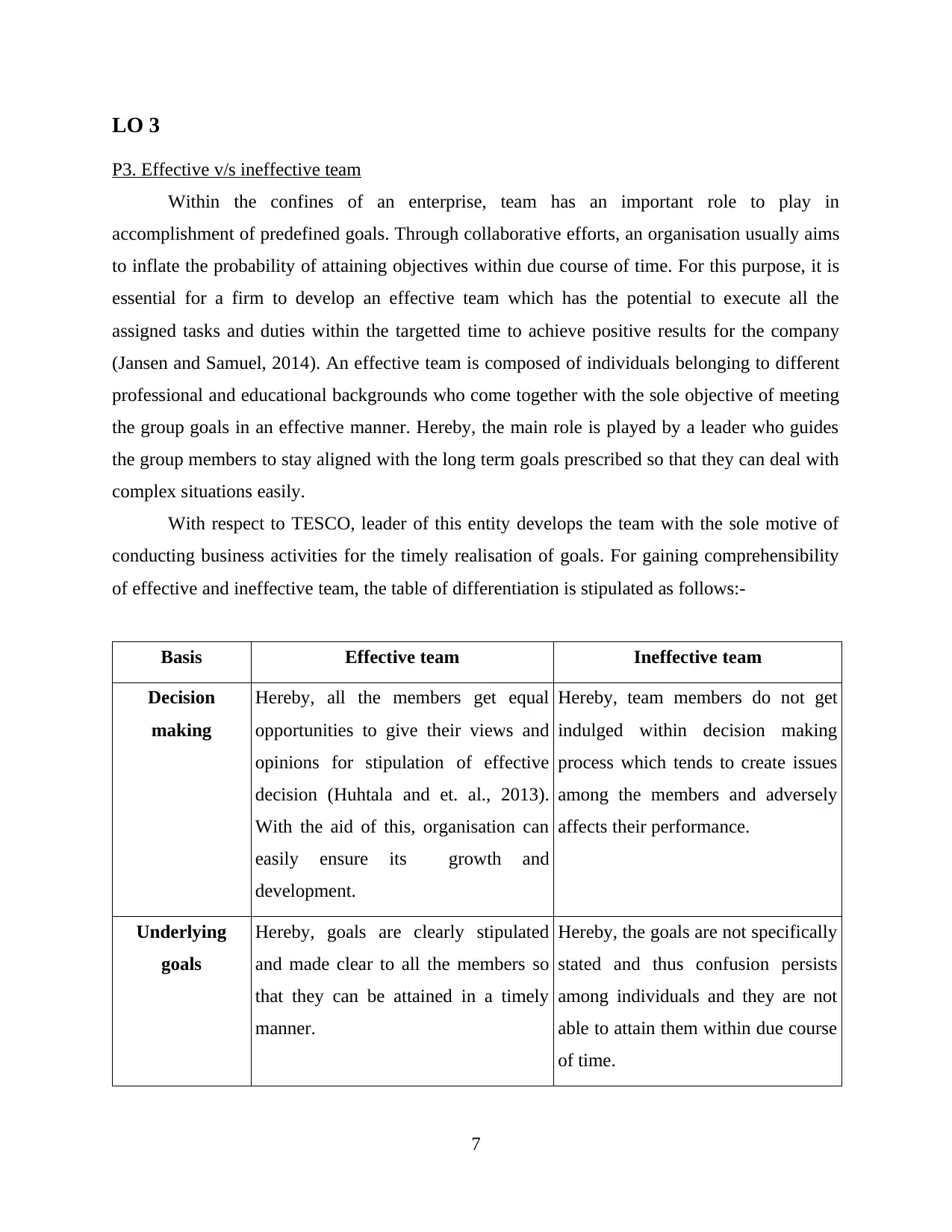
LO 3
P3. Effective v/s ineffective team
Within the confines of an enterprise, team has an important role to play in
accomplishment of predefined goals. Through collaborative efforts, an organisation usually aims
to inflate the probability of attaining objectives within due course of time. For this purpose, it is
essential for a firm to develop an effective team which has the potential to execute all the
assigned tasks and duties within the targetted time to achieve positive results for the company
(Jansen and Samuel, 2014). An effective team is composed of individuals belonging to different
professional and educational backgrounds who come together with the sole objective of meeting
the group goals in an effective manner. Hereby, the main role is played by a leader who guides
the group members to stay aligned with the long term goals prescribed so that they can deal with
complex situations easily.
With respect to TESCO, leader of this entity develops the team with the sole motive of
conducting business activities for the timely realisation of goals. For gaining comprehensibility
of effective and ineffective team, the table of differentiation is stipulated as follows:-
Basis Effective team Ineffective team
Decision
making
Hereby, all the members get equal
opportunities to give their views and
opinions for stipulation of effective
decision (Huhtala and et. al., 2013).
With the aid of this, organisation can
easily ensure its growth and
development.
Hereby, team members do not get
indulged within decision making
process which tends to create issues
among the members and adversely
affects their performance.
Underlying
goals
Hereby, goals are clearly stipulated
and made clear to all the members so
that they can be attained in a timely
manner.
Hereby, the goals are not specifically
stated and thus confusion persists
among individuals and they are not
able to attain them within due course
of time.
7
P3. Effective v/s ineffective team
Within the confines of an enterprise, team has an important role to play in
accomplishment of predefined goals. Through collaborative efforts, an organisation usually aims
to inflate the probability of attaining objectives within due course of time. For this purpose, it is
essential for a firm to develop an effective team which has the potential to execute all the
assigned tasks and duties within the targetted time to achieve positive results for the company
(Jansen and Samuel, 2014). An effective team is composed of individuals belonging to different
professional and educational backgrounds who come together with the sole objective of meeting
the group goals in an effective manner. Hereby, the main role is played by a leader who guides
the group members to stay aligned with the long term goals prescribed so that they can deal with
complex situations easily.
With respect to TESCO, leader of this entity develops the team with the sole motive of
conducting business activities for the timely realisation of goals. For gaining comprehensibility
of effective and ineffective team, the table of differentiation is stipulated as follows:-
Basis Effective team Ineffective team
Decision
making
Hereby, all the members get equal
opportunities to give their views and
opinions for stipulation of effective
decision (Huhtala and et. al., 2013).
With the aid of this, organisation can
easily ensure its growth and
development.
Hereby, team members do not get
indulged within decision making
process which tends to create issues
among the members and adversely
affects their performance.
Underlying
goals
Hereby, goals are clearly stipulated
and made clear to all the members so
that they can be attained in a timely
manner.
Hereby, the goals are not specifically
stated and thus confusion persists
among individuals and they are not
able to attain them within due course
of time.
7
Paraphrase This Document
Need a fresh take? Get an instant paraphrase of this document with our AI Paraphraser
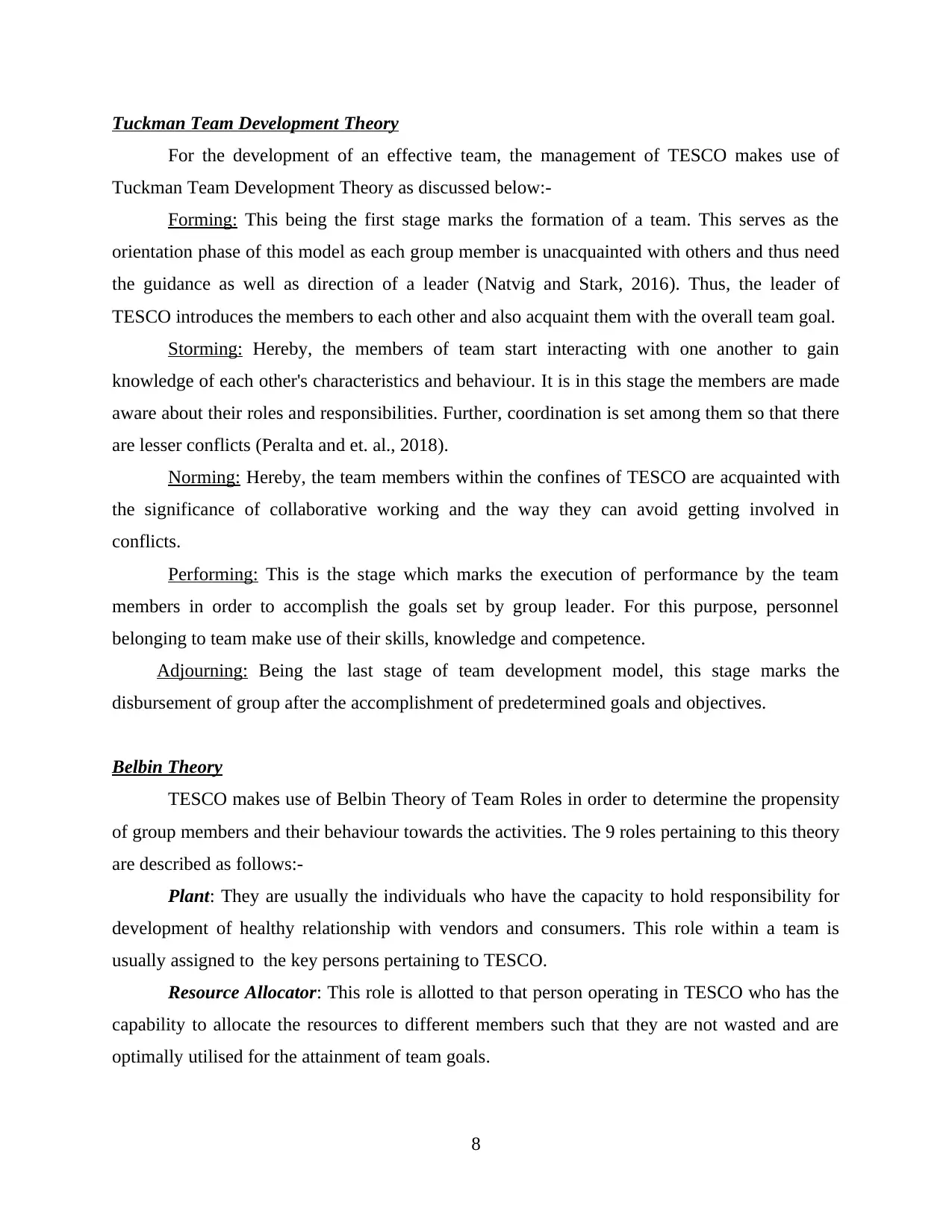
Tuckman Team Development Theory
For the development of an effective team, the management of TESCO makes use of
Tuckman Team Development Theory as discussed below:-
Forming: This being the first stage marks the formation of a team. This serves as the
orientation phase of this model as each group member is unacquainted with others and thus need
the guidance as well as direction of a leader (Natvig and Stark, 2016). Thus, the leader of
TESCO introduces the members to each other and also acquaint them with the overall team goal.
Storming: Hereby, the members of team start interacting with one another to gain
knowledge of each other's characteristics and behaviour. It is in this stage the members are made
aware about their roles and responsibilities. Further, coordination is set among them so that there
are lesser conflicts (Peralta and et. al., 2018).
Norming: Hereby, the team members within the confines of TESCO are acquainted with
the significance of collaborative working and the way they can avoid getting involved in
conflicts.
Performing: This is the stage which marks the execution of performance by the team
members in order to accomplish the goals set by group leader. For this purpose, personnel
belonging to team make use of their skills, knowledge and competence.
Adjourning: Being the last stage of team development model, this stage marks the
disbursement of group after the accomplishment of predetermined goals and objectives.
Belbin Theory
TESCO makes use of Belbin Theory of Team Roles in order to determine the propensity
of group members and their behaviour towards the activities. The 9 roles pertaining to this theory
are described as follows:-
Plant: They are usually the individuals who have the capacity to hold responsibility for
development of healthy relationship with vendors and consumers. This role within a team is
usually assigned to the key persons pertaining to TESCO.
Resource Allocator: This role is allotted to that person operating in TESCO who has the
capability to allocate the resources to different members such that they are not wasted and are
optimally utilised for the attainment of team goals.
8
For the development of an effective team, the management of TESCO makes use of
Tuckman Team Development Theory as discussed below:-
Forming: This being the first stage marks the formation of a team. This serves as the
orientation phase of this model as each group member is unacquainted with others and thus need
the guidance as well as direction of a leader (Natvig and Stark, 2016). Thus, the leader of
TESCO introduces the members to each other and also acquaint them with the overall team goal.
Storming: Hereby, the members of team start interacting with one another to gain
knowledge of each other's characteristics and behaviour. It is in this stage the members are made
aware about their roles and responsibilities. Further, coordination is set among them so that there
are lesser conflicts (Peralta and et. al., 2018).
Norming: Hereby, the team members within the confines of TESCO are acquainted with
the significance of collaborative working and the way they can avoid getting involved in
conflicts.
Performing: This is the stage which marks the execution of performance by the team
members in order to accomplish the goals set by group leader. For this purpose, personnel
belonging to team make use of their skills, knowledge and competence.
Adjourning: Being the last stage of team development model, this stage marks the
disbursement of group after the accomplishment of predetermined goals and objectives.
Belbin Theory
TESCO makes use of Belbin Theory of Team Roles in order to determine the propensity
of group members and their behaviour towards the activities. The 9 roles pertaining to this theory
are described as follows:-
Plant: They are usually the individuals who have the capacity to hold responsibility for
development of healthy relationship with vendors and consumers. This role within a team is
usually assigned to the key persons pertaining to TESCO.
Resource Allocator: This role is allotted to that person operating in TESCO who has the
capability to allocate the resources to different members such that they are not wasted and are
optimally utilised for the attainment of team goals.
8
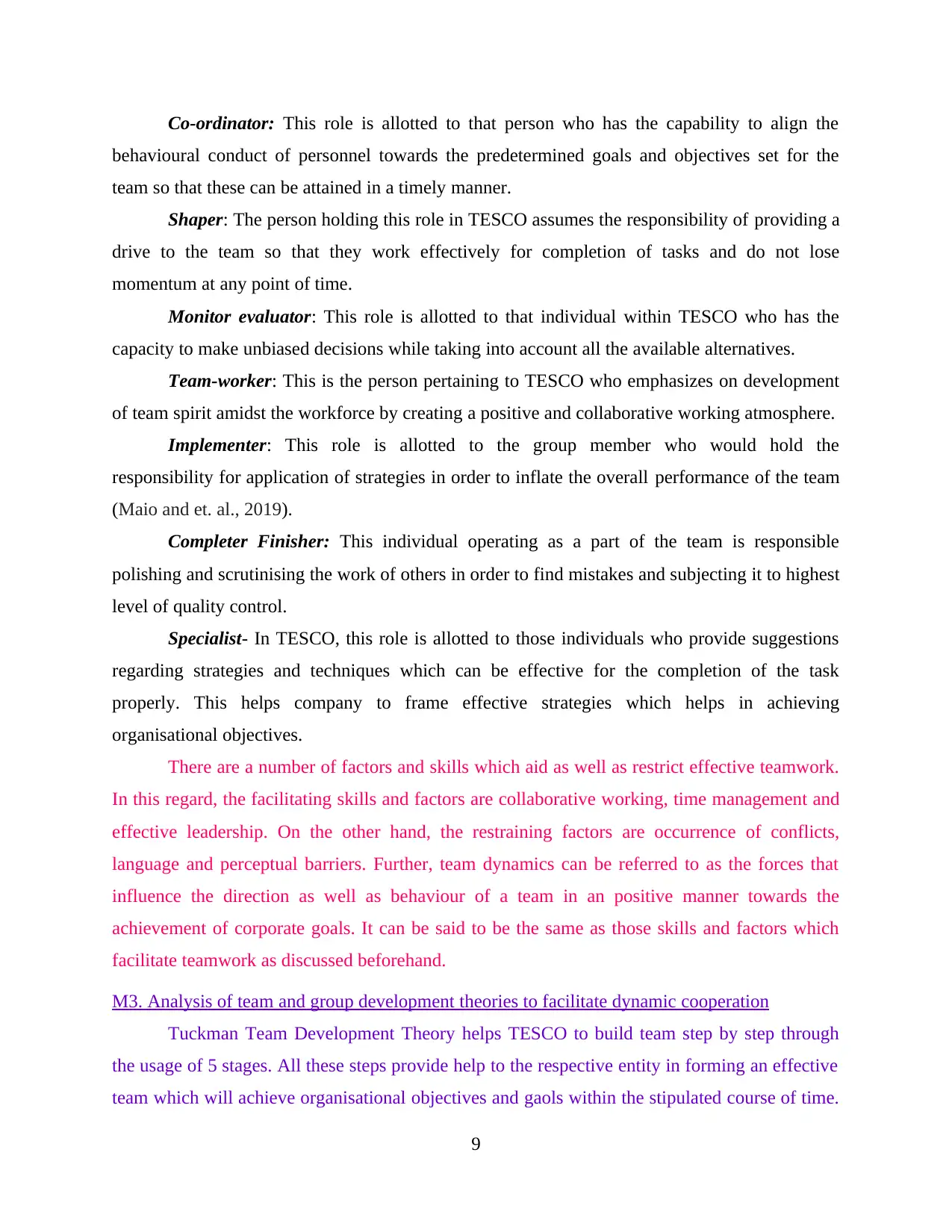
Co-ordinator: This role is allotted to that person who has the capability to align the
behavioural conduct of personnel towards the predetermined goals and objectives set for the
team so that these can be attained in a timely manner.
Shaper: The person holding this role in TESCO assumes the responsibility of providing a
drive to the team so that they work effectively for completion of tasks and do not lose
momentum at any point of time.
Monitor evaluator: This role is allotted to that individual within TESCO who has the
capacity to make unbiased decisions while taking into account all the available alternatives.
Team-worker: This is the person pertaining to TESCO who emphasizes on development
of team spirit amidst the workforce by creating a positive and collaborative working atmosphere.
Implementer: This role is allotted to the group member who would hold the
responsibility for application of strategies in order to inflate the overall performance of the team
(Maio and et. al., 2019).
Completer Finisher: This individual operating as a part of the team is responsible
polishing and scrutinising the work of others in order to find mistakes and subjecting it to highest
level of quality control.
Specialist- In TESCO, this role is allotted to those individuals who provide suggestions
regarding strategies and techniques which can be effective for the completion of the task
properly. This helps company to frame effective strategies which helps in achieving
organisational objectives.
There are a number of factors and skills which aid as well as restrict effective teamwork.
In this regard, the facilitating skills and factors are collaborative working, time management and
effective leadership. On the other hand, the restraining factors are occurrence of conflicts,
language and perceptual barriers. Further, team dynamics can be referred to as the forces that
influence the direction as well as behaviour of a team in an positive manner towards the
achievement of corporate goals. It can be said to be the same as those skills and factors which
facilitate teamwork as discussed beforehand.
M3. Analysis of team and group development theories to facilitate dynamic cooperation
Tuckman Team Development Theory helps TESCO to build team step by step through
the usage of 5 stages. All these steps provide help to the respective entity in forming an effective
team which will achieve organisational objectives and gaols within the stipulated course of time.
9
behavioural conduct of personnel towards the predetermined goals and objectives set for the
team so that these can be attained in a timely manner.
Shaper: The person holding this role in TESCO assumes the responsibility of providing a
drive to the team so that they work effectively for completion of tasks and do not lose
momentum at any point of time.
Monitor evaluator: This role is allotted to that individual within TESCO who has the
capacity to make unbiased decisions while taking into account all the available alternatives.
Team-worker: This is the person pertaining to TESCO who emphasizes on development
of team spirit amidst the workforce by creating a positive and collaborative working atmosphere.
Implementer: This role is allotted to the group member who would hold the
responsibility for application of strategies in order to inflate the overall performance of the team
(Maio and et. al., 2019).
Completer Finisher: This individual operating as a part of the team is responsible
polishing and scrutinising the work of others in order to find mistakes and subjecting it to highest
level of quality control.
Specialist- In TESCO, this role is allotted to those individuals who provide suggestions
regarding strategies and techniques which can be effective for the completion of the task
properly. This helps company to frame effective strategies which helps in achieving
organisational objectives.
There are a number of factors and skills which aid as well as restrict effective teamwork.
In this regard, the facilitating skills and factors are collaborative working, time management and
effective leadership. On the other hand, the restraining factors are occurrence of conflicts,
language and perceptual barriers. Further, team dynamics can be referred to as the forces that
influence the direction as well as behaviour of a team in an positive manner towards the
achievement of corporate goals. It can be said to be the same as those skills and factors which
facilitate teamwork as discussed beforehand.
M3. Analysis of team and group development theories to facilitate dynamic cooperation
Tuckman Team Development Theory helps TESCO to build team step by step through
the usage of 5 stages. All these steps provide help to the respective entity in forming an effective
team which will achieve organisational objectives and gaols within the stipulated course of time.
9
⊘ This is a preview!⊘
Do you want full access?
Subscribe today to unlock all pages.

Trusted by 1+ million students worldwide
1 out of 16
Related Documents
Your All-in-One AI-Powered Toolkit for Academic Success.
+13062052269
info@desklib.com
Available 24*7 on WhatsApp / Email
![[object Object]](/_next/static/media/star-bottom.7253800d.svg)
Unlock your academic potential
Copyright © 2020–2026 A2Z Services. All Rights Reserved. Developed and managed by ZUCOL.





